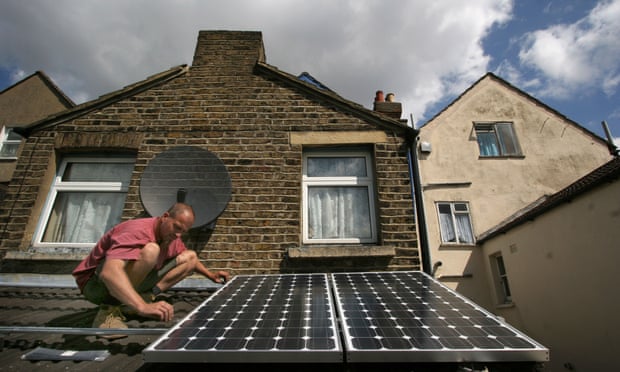Solar power subsidies cut might save just 50p on average electricity bill
Industry executives say latest government attack on renewable energy will take UK ‘back to the dark ages’, hitting jobs and investment
The government has unveiled plans to slash subsidies to solar power projects in an attempt to drive down annual household electricity bills, but later admitted it might save customers just 50p a year.
Industry executives warned the latest attack on renewables would take Britain “back to the dark ages”, hitting jobs and investment while damaging David Cameron’s credibility on tackling climate change.
Ministers have targeted larger solar installations of less than 5 megawatts – enough to power 2,500 homes – in a consultation on the early closure of the renewable obligation (RO) subsidy in April 2016.
The government also announced a review of another subsidy, the feed-in tariff, to make further significant savings in a move that could threaten state support for solar panels on roof tops.
In addition, ministers are to remove the guaranteed level of subsidy for coal or other fossil fuel power plants that switch to greener fuels such as biomass – generated by burning plants or wood pellets. The government says the move could save £500m a year from 2020 onwards.
Amber Rudd, the energy and climate change secretary, said the aim overall was to bring costs under control and she denied it would chase away investment.
She added: “My priorities are clear. We need to keep bills as low as possible for hardworking families and businesses while reducing our emissions in the most cost-effective way.
“Our support has driven down the cost of renewable energy significantly. As costs continue to fall it becomes easier for parts of the renewables industry to survive without subsidies. We’re taking action to protect consumers, whilst protecting existing investment.”
The government said its initial objective was to reduce a £1.5bn cost overrun in the amount of subsidies being paid to the renewable energy sector by 2020/21 but indicated that more measures would follow to slash costs.
The cost overrun, it admitted, had been caused by a variety of factors including low power prices and larger than expected investment in solar and other “green energy” projects. But the planned cuts to subsidies for solar would only net between £40m and £100m by 2020, the equivalent of 50p to £1.20 a year off the average electricity bill, according to government background documents.
The attack on solar follows government attempts to end onshore wind subsidies and speculation that widespread cuts of energy efficiency subsidies will come later this year.
Michael Grubb, professor of international energy and climate change policy at University College London, said the announcement was a pivotal moment in UK energy policy that gave the impression of two different governments running the country’s energy policy.
“One is ... pressing for strong international action on climate change, which signed an unambiguous cross-party pledge to phase out unabated coal, reiterated its carbon targets and which committed in its manifesto to deliver clean renewable energy as cost-effectively as possible.
“The other is a government which has moved to prematurely end supports for the cheapest of the UK’s main renewable resources, which has injected fear and uncertainty into renewable energy investors and which seems set to also scrap energy efficiency programmes which have helped to cut consumer bills and avoided the need for billions of pounds of new fossil fuel investments.”
Richard Kirkman, technical director of environmental services group Veolia UK expressed grave concern about the government plans, saying: “We appear to be entering another dark age where we will return to total fossil fuel reliance, power cuts, low confidence in UK investment, opening the door for fracking activities to maintain energy security.”
Lord Oxburgh, a former chairman of the Shell, said ministers should remember the example of the North Sea oil industry, which took consistent Treasury aid to get off the ground.
“If we’re serious about building a new, clean energy industry in the UK, including our unique offshore wind resource in the North Sea, that also needs stable, long-term support from government,” he said.
Angus MacNeil MP, the SNP chair of the energy and climate change committee, said the proposals would evade scrutiny because they had been unveiled during the parliamentary recess.
Rudd had hinted at her stance on renewable energy subsidies at a meeting of MacNeil’s committee on Tuesday. She argued onshore wind farms could be built in Britain without any kind of financial aid.
Source by: http://www.theguardian.com/environment/2015/jul/22/solar-power-subsidies-to-be-cut-under-plans-to-reduce-green-energy-costs

No comments:
Post a Comment